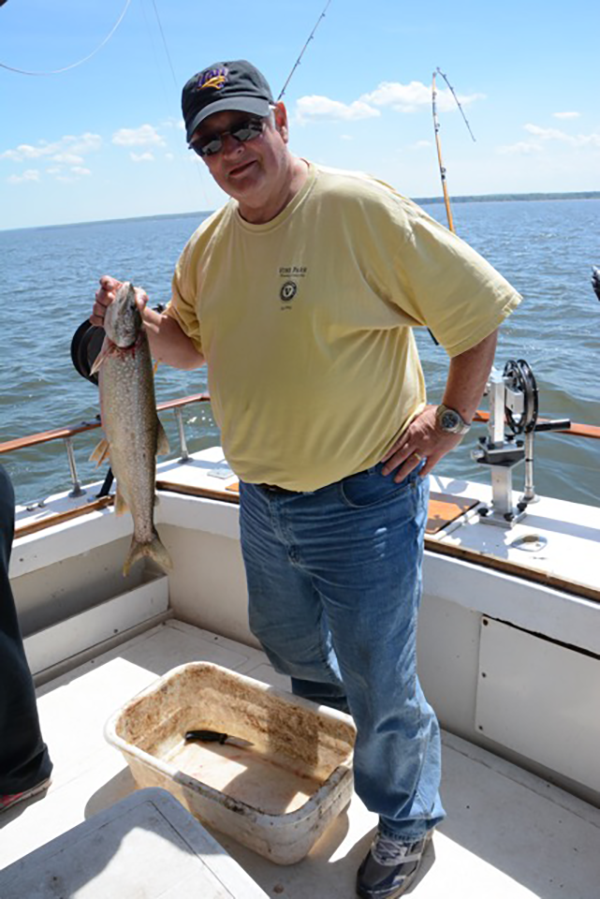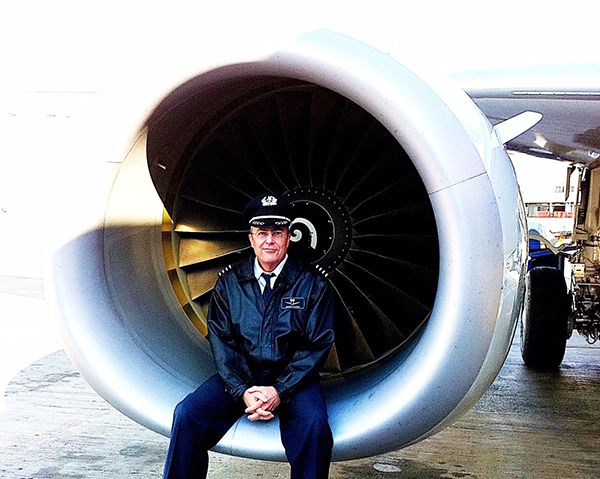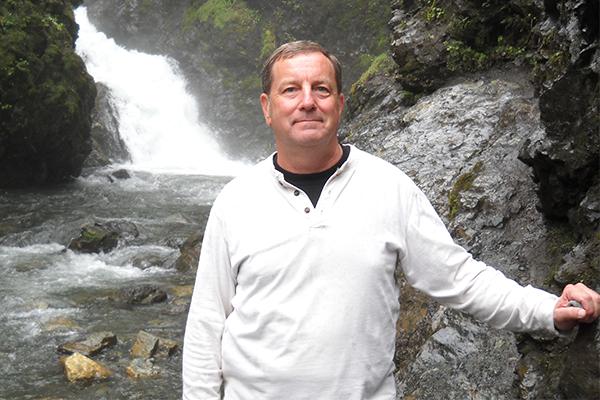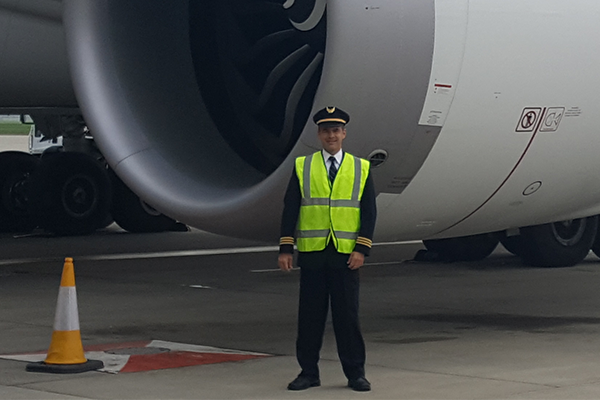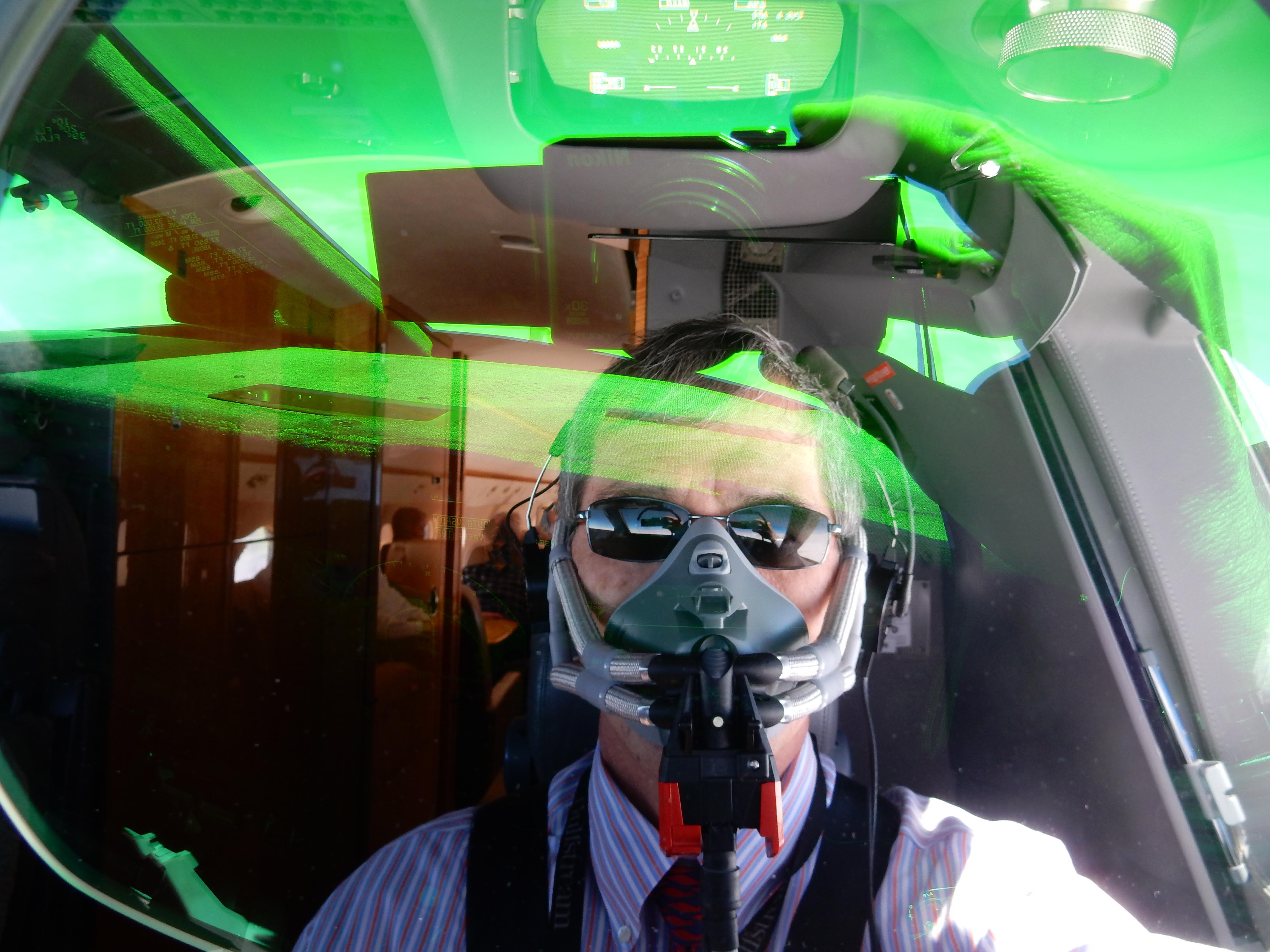As I near retirement my marching orders from on high are to replace myself with myself; we have been on the hunt for another Air Force veteran with command experience, a logbook filled with international flight operations in transport category aircraft, and experience with things blowing up on occasion. It has been a long and frustrating process, especially given that most Air Force pilots have visions of airline careers ahead of them.
— James Albright

Updated:
2016-09-05
I spent five years training with United Airlines when they had the contract to keep us Air Force Boeing 747 pilots fully qualified in the airplane and Category III ILS operations; the experience soured me on the airline experience and turned my sights to corporate aviation. Since then I've been of the opinion that success with the airlines depends on luck; you have to pick a survivor but you can't predict which carrier will still be around in two years, much less twenty. I've also believed that you can survive multiple job changes as a corporate pilot based on skill and hard work. To me the airlines versus corporate aviation question was easy. So I set out to prove that point by interviewing three Air Force pilots turned airlines, and three others turned corporate. As it turns out I was wrong.
I think the reason many of our preconceived notions about the airlines or corporate aviation are so varied is because the institutions themselves are so varied. So let's get specific about what we are talking about. We are only considering major airlines who appear to have a better than even chance of surviving the next few decades. My crystal ball tells me this list includes American, Delta, JetBlue, Southwest, and United. You have to be even more careful when looking at business and corporate Aviation. I would only consider someone flying an international business jet with at least a 4,000 nm range; basically the higher end Falcons (Dassault), Globals (Bombardier), and Gulfstreams. That isn't to say other business jets and airlines are bad bets, but if you are a highly experienced Air Force pilot you may be better served raising your sights.
What follows are the answers to ten questions I posed to each of six pilots, interspersed with a few of my comments. Each of these pilots are highly successful in their chosen career paths, and maybe it will give you greater clarity on which path to take. They are listed in the order that I first met them. I then followed all that with my answers and conclusions. Is this scientific? No. But it may give you a perspective you didn't have. Oh yes, if you are that Air Force pilot we have been looking for, contact "Eddie" below.
Even knowing what I know today, if transported back in time to the year 2000, I think I would still opt for the life I chose. I am told, and I believe, that I would be bored senseless as an airline pilot. But having said that, I think the right answer for most Air Force pilots in the year 2016 is probably to find one of the strongest major airlines; you will probably enjoy steady employment flying well maintained equipment in well run organizations. Today's pilot shortage is real and is going to get worse; the demand for Air Force pilots will only increase.
But if you want a greater variety in your flying, if you want to get more involved with more than just the mechanics of flying from Point A to Point B, if the term "city pair" bores you, or if you can't find a major airline, you should investigate a corporate operation at the top end, flying a long range Gulfstream, Dassault, or Bombardier product. But you should make this decision early because it isn't easy to start with a an airline and fall back to corporate aviation. The airline mind-set doesn't work in corporate aviation and very few airline pilots make the transition successfully.
- Steve Nichols — A senior Airbus captain with a major airline, you may recognize Steve as "The Nick" from one of my books. He got out after maxing out his Air Force pilot credentials (flight examiner) and then did the accelerated upgrade program at the majors.
- Chris Manno — A senior Boeing 737-800 captain who left the Air Force after six years and was hired immediately by a major airline where he has been ever since. His timing has been superb, he spent minimal time sitting sideways or in the right seat, has never been furloughed, and has had the time to pursue other interests.
- Keith Rumohr — A retired corporate aviation captain who flew the heavy iron (Bombardier Global Express) all over the world with one great company after another. He's always had great variety in his flying, in the military and out. I think he retired too early, but he made all the right choices and has many interests outside aviation and can afford to pursue the next chapter.
- Chris Didier — A Boeing 787 first officer who left the Air Force after twenty years flying Learjets and fighters. Chris is proof you can have a full Air Force career and end up with a major airline with bright prospects. And, by the way, he spent two years flying corporate.
- Kevin Knecht — A Gulfstream IV Captain who has kept multiple qualifications over the years in a great variety of aircraft. His twenty years on active duty shows his depth: C-141, C-20, C-17; all three as an instructor pilot. He has tended to fly for family owners and I think that interpersonal touch is one of his strong points. This is an aspect of flying you cannot get with an airline.
- James Albright — That's me.
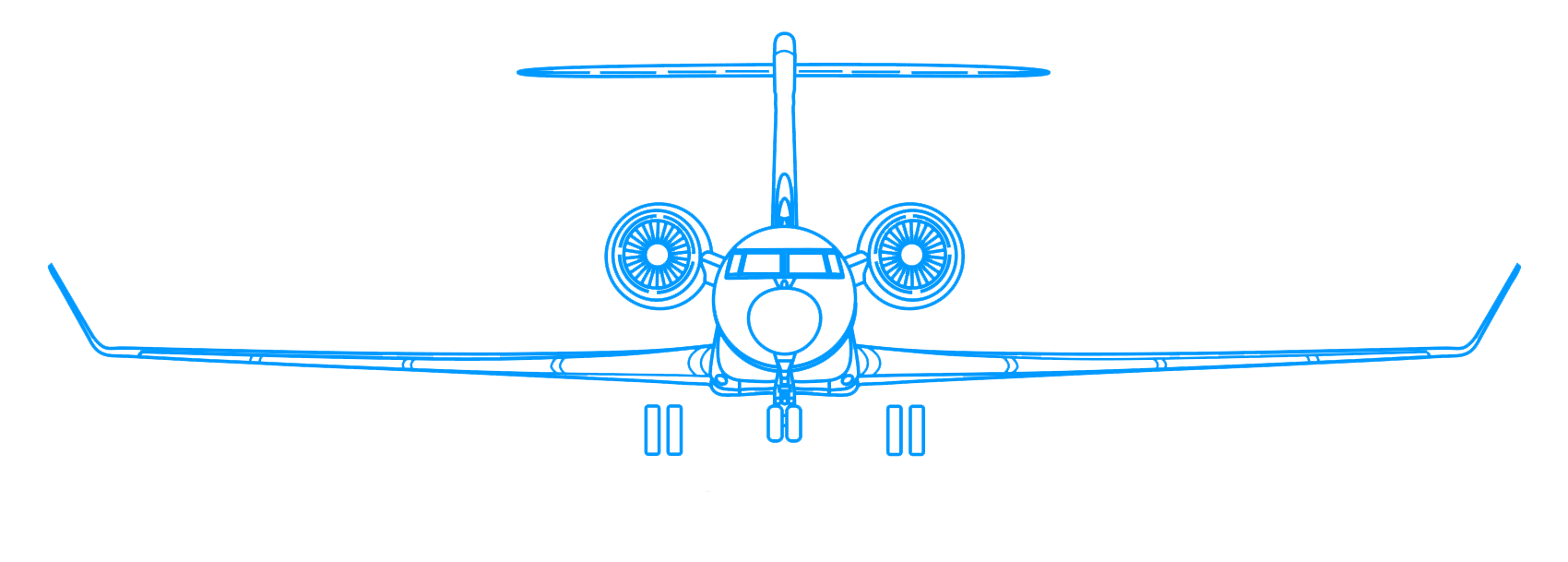
1
Captain Steve Nichols
I've known Steve since 1982 when I was assigned to be his copilot in Hawaii flying the EC-135J (Boeing 707). He is the infamous "Bruce 1" you may have heard about and is responsible for many of my attitudes about flying. We never used the word "mentor" back then but that's what he was. His answers are quite frank. Or as he would say, "No I'm Steve, Frank is another guy."
What was your motivation for selecting the airlines or a business/corporate aviation career?
For me, I was working very long days in the Air Force - even when no flying was involved. I came home too tired to really appreciate my young kids and be the kind of Dad I wanted to be. Even at home, a “brick” was firmly attached to my side that could take away what little time I had. A victim of “Do more with less!”
Has your choice been a stable one? Any furloughs or periods of unemployment?
Stable? No. The airline was the first job I ever had where the pay went up and down bending with the whims of shifting fortunes in the economy and staffing personnel (bean counters) decisions. Truly airline job security was, in the beginning, a sine wave at best. I was more fortunate than some, in that I avoided being furloughed, but events (bankruptcy) destroyed any savings I had. Having said that, times are better now - until the next 9-11 event or SARS, etc, comes along!
Have you been impressed or disappointed by the professionalism of your peers? Do they and your company take safety as seriously as they should?
Most of the pilots I fly with are very good. I would say the only difference really is that “merit” gives way to seniority in the airline. Safety IS a serious topic, and as a Captain, the phrase “the buck stops here” is very much alive. I credit my current employer for valuing my operational decisions; so far I have not been questioned, even when it cost the airline some money.
Have you had to change companies along the way? How did the transition go? Was there a cut in pay?
Yes, one change. The transition was very rough for some of us. Cut in pay, yes and no. The current pay rate went up - but career advancement to larger and better paying aircraft was halted for those of us on the short side of the seniority list merger. (Does that give away which airlines we are talking about?)
Has your career choice hurt or hindered family life?
Family life has actually improved somewhat. I am gone a lot, but when I am home - I am home and the work phone is NOT ringing.
Have you had to move or commute against your wishes?
Move no. Commute yes. It was always my plan in the beginning to move to where I was based. Silly me. I had 4 bases in my first 9 months of which only one was my choice. In that time, I liked where I was and have stayed for the duration. Commuting was fairly easy in the beginning - until the advent of increased regional jet flying for the mainline carriers. Commuting has been tough, but do-able.
Do you get travel benefits for you and your family? Have these been beneficial?
Travel benefits yes. “Non-revving” is tough because the airlines have grown more efficient in matching seats available to demand. As such, travel bennies not used much.
Has the pay and other benefits met your expectations?
If the pay had been stable - the answer would have been yes. See next question.
Has your career choice set you up for retirement?
NO!!! My pension was frozen at half of what it should have been - and converted from a defined benefit plan to a defined contribution plan. The initial contribution - was ZERO - as I still had “some” of the old plan in place. It has gotten better recently, but as I am older, time is not on my side.
Now that you are an established (or retired) professional in your chosen career path, have your expectations been met? Do you think the other career track may have been a better choice?
Tough question. I have been hard on the airline in many of my responses, but overall, I believe it was the right choice for me. Had I stayed in the Air Force longer, I may not have been hired at the airline. Also, I am now flying with First Officers who have been First Officers for as many as 13 years or more. I upgraded to Captain at the 6 year point. Luck of the times. Times seem to be good right now as there are many upcoming retirements, including my own. My experience has been that the good times are cyclical - as are many other professions. I also have been fortunate NOT to have to sell insurance or some other job that I am not really suited to. (No offense to insurance salesmen intended!) I valued my Air Force times, especially for the camaraderie. That takes longer to build at the airline.
My thoughts
Air Force pilots turned airline did very well in the late eighties, their timing was perfect. At the time it didn't seem so. Some airlines started a "B Scale," or equivalent, that let new hires know that they were second tier pilots. Their pay suffered and many predicted they would be on the tail end for their entire careers. Not so. The B Scale was soon abolished and these pilots ended up senior quickly. Those that followed languished. I know a few Air Force peers who got out just ten years after Steve who will never upgrade to captain. (Fifteen years as a first officer? I don't think I could do that and remain sane.) Here we are twenty years further along and the cycle has changed again. It seems if you are hired today, you may find yourself as lucky as Steve and Chris Manno . . .
2
Captain Chris Manno
I've known Chris since 1982, before he had a civilian pilot's license. He went from no pilot's license to airline pilot in about six months, spent just a few years on that airline's experiment with the "B-Scale," and upgraded to Captain in less than five years. In short, his timing was perfect.
What was your motivation for selecting the airlines or a business/corporate aviation career?
I was looking for stability and staying power. Corporate flying tends to reduce or vanish with a declining economy, which is inevitable over the course of several decades. Airline pilot jobs tend to endure, even with furloughs.
Plus, I wanted a schedule and no collateral duties such as bag handling or flight planning. I wanted a fleet of big, new jets on established routes with many set schedules to choose from.
Has your choice been a stable one? Any furloughs or periods of unemployment?
Mine has been stable: 31 years next month, 25 as captain, never furloughed, on reserve 5 months my whole career. We all stagnated post-9/11, but for me that was as a trip holder captain. We took pay cuts then too, but they've all been restored and well exceeded in current pay rates.
Have you been impressed or disappointed by the professionalism of your peers? Do they and your company take safety as seriously as they should?
That's two separate questions. I believe everyone at my airline takes safety as seriously as they should. But with a variety of backgrounds (military, civilian, regional, corporate) we do have a range of professionalism, although that's purely subjective. An objective look at safety stats proves the former point regardless.
Have you had to change companies along the way? How did the transition go? Was there a cut in pay?
Never changed airlines.
Has your career choice hurt or hindered family life?
I think the opposite: home more and longer than any 9-5 career would allow. Especially the last 5 years flying turns, home every night, off 18 days a month.
Have you had to move or commute against your wishes?
Never.
Do you get travel benefits for you and your family? Have these been beneficial?
Yes, plus deep discounts for tickets on our airline, for me as a pilot, access to virtually every airline's jumpseat. We accept as many jumpseaters on our flights as we have empty cabin seats. So in essence, pilots can fly free on most airlines. I personally hate air travel and do as little as possible.
Has the pay and other benefits met your expectations?
Yes. My AF peers who stayed in past 7 or for a full 20 do not make up the deficit in current airline pay and retirement, much of which depends on years as captain. No nine to five profession would provide the same income for a basic person with a bachelor's degree, and I would speculate that few corporate flight jobs last 30-35 years.
Has your career choice set you up for retirement?
Yes.
Now that you are an established (or retired) professional in your chosen career path, have your expectations been met? Do you think the other career track may have been a better choice?
I believe my expectations have been met and in most cases, exceeded--I'd mainly hoped for continuous flying for good pay. I've averaged 75 hours a month since 1985 and have had high seniority and thus good schedules the whole time.
My thoughts
Chris has been an airline captain for twenty-five years now, is a college professor, is an accomplished writer and cartoonist (he drew "Eddie" on the top of every page on this website), and plays lead guitar for a band. There are definite benefits to the time off afforded by a good airline pilot's schedule. But that is certainly possible if you pick the right employer as a corporate pilot, as Keith's career proves . . .
3
Captain Keith Rumohr
I've known Keith since my Hawaii Boeing 707 days; I think he showed up towards the end of my time there around 1985. Since then we flew together in the Boeing 747 and the Challenger 604. He is about my age and has already retired. He's done something right.
What was your motivation for selecting the airlines or a business/corporate aviation career?
I elected corporate aviation for a couple of reasons. First I wanted to know the Pilots that I flew with, the mechanics that worked on the aircraft, and wanted to know each aircraft that I flew. I wanted to maintain that small squadron feeling. Airlines seemed to be too impersonal for me. (Pilot 5347 flying with pilot 3915 on aircraft 436.)
Second, I wanted variety in the trips that I took. Corporate can be a great combination of domestic US trips or overseas trips anywhere in the world. Find the right company and you can achieve a great balance.
Has your choice been a stable one? Any furloughs or periods of unemployment?
Stable, not hardly. Corporate flight departments come and go with business expansion, contraction and mergers. I changed companies twice due to mergers and once due to downsizing. Fortunately, I was never unemployed and always moved into a better and more lucrative situation. Once again, the key is finding the right company.
Have you been impressed or disappointed by the professionalism of your peers? Do they and your company take safety as seriously as they should?
It has been a mixed bag. Most of the corporate pilots I flew with were excellent pilots that put safety first. Occasionally, I encountered a pilot the should have been let go due to performance issues or let safety slip in a misguided effort to maintain the schedule and keep the passenger happy. The companies all emphasized safety of operations, but sometimes you wondered if management would really have your back if you disappointed the passengers. Fortunately, I never had passengers or management complain when I made a decision for safety reasons.
Have you had to change companies along the way? How did the transition go? Was there a cut in pay?
I changed companies 4 times. Each time there was a “probation” period where you worked as first officer, getting to know the operation and the people and personalities that you would be working with. This also gave the principal passengers time to get to know you and get comfortable with the new guy in the pointy end that had their lives in his/her hands. In 6 months to a year, you were upgraded to Captain.
I never experienced a real cut in pay. By the time I upgraded to Captain, I was making more than I was at the previous company.
Has your career choice hurt or hindered family life?
The “always on call” nature of corporate aviation does hinder some aspects of family life. Most companies try to preserve planned home periods, but occasionally, a “pop up” trip or illness of a pilot would change that. If a corporate operation has the correct manning levels, there is plenty of time off.
My schedule has varied between working 23 days one month down to 1 day the next.
Have you had to move or commute against your wishes?
I have never had to commute. However, with corporate, you usually have to live within a certain radius from the home field. Most companies require you to live within 1 hour of the field. There do exist corporations that will allow you to live greater distances away or allow you to commute.
Do you get travel benefits for you and your family? Have these been beneficial?
With corporate there have been no real travel benefits for family. Occasionally, my spouse has been able to join me at a nice destination.
Has the pay and other benefits met your expectations?
Overall the pay has exceeded my expectations. In corporate, pay is driven by time with the company and the aircraft they operate. Make the right choices and the pay is excellent. If you prefer small aircraft that are domestic only and home most nights, your pay will suffer.
Has your career choice set you up for retirement?
I have been able to save sufficiently to fund a decent retirement. As most corporations have rid themselves of pensions, it is up to the individual to take full advantage of 401ks and save/invest wisely.
Now that you are an established (or retired) professional in your chosen career path, have your expectations been met? Do you think the other career track may have been a better choice?
Corporate aviation exceeded my expectations with the exception of having to change companies due to things beyond my control. The people I worked with, the aircraft I flew and passengers that I worked with were terrific. The key is getting on with the right company.
I believe that corporate flying preserved my joy of flying and it never became, just a job. Whether the trip was a one day trip to Hope, Arkansas or a 3 week around the world trip, the autonomy of decision making and the variety of trip composition made every day a new adventure and challenge.
On the other hand, the pay and travel benefits would probably have been better had I taken the airline track.
My thoughts
Keith got out of the Air Force about five years before me and that head start served him well. But as good as his post-military career has been, he realizes that maybe the airlines would have paid better. I agree, but I also think he has had a richer and more fulfilling career as a corporate pilot.
4
First Officer Chris Didier
I've known Chris since he was a second lieutenant and I was a lieutenant colonel and his squadron commander in Germany. He ended up in our squadron right out of pilot training, something only the top stick in a pilot training class could hope for. Since then he moved on to the F-15E and he served a full Air Force career, retiring as a lieutenant colonel himself. He sampled the corporate pilot life and then moved on to a major airline, proving you can do all three (military, corporate, airline).
What was your motivation for selecting the airlines or a business/corporate aviation career?
To me, it was a natural transition from being a military pilot to civilian one. To help me decide, I contacted every former mil pilot whom I've worked with in the past who now flies for an airline or corporate and asked 2 simple questions: What do you like about your job....and what you didn't like. It was emphasized by them that being a professional pilot (airline or corporate) is not for everyone. Just like any job I have had, there are the upsides and downsides for every job. To me, the biggest downside was multiple days away. The upsides were potentially ample time off, low stress and good pay/benefits, etc.
Has your choice been a stable one? Any furloughs or periods of unemployment?
After mil retirement, I first flew with a Part-135 corporate company for 2 years and enjoyed the work. I was greatly concerned, however, of job security. During my time there, I witnessed 3 of our competitors close their doors with little to no notice. Basically, I felt vulnerable. I made the decision to join the ranks of a major airline and feel great about my choice. Based on the current hiring trend (since 2013), I feel I am in a very stable position. I don't expect our company will be looking at a furlough situation in the near future (hopefully longer) unless a cataclysmic event occurs. Then I suppose we are all potentially at risk, regardless of what name is painted on the outside of the jet.
Have you been impressed or disappointed by the professionalism of your peers? Do they and your company take safety as seriously as they should?
I have been greatly impressed by most all of my peers both with the -135 and -121 world. There have been very few exceptions. Safety is very paramount.
Have you had to change companies along the way? How did the transition go? Was there a cut in pay?
My transition from corporate aviation to the airlines was very simple. I took a ~20% cut in salary the first year at the airline. However, I exceeded my corporate salary slightly in my 2nd year at United and exceeded significantly in my 3rd year. This doesn't factor any retirement contribution differences.
Has your career choice hurt or hindered family life?
Flying corporate was more demanding and averaged 16 full days per month on the road (8/6 work schedule). That part was the downside of the job in my opinion. At the airline, I have averaged 9 days of work per month (reserve work) and has been a great increase in QOL with increased family time.
Have you had to move or commute against your wishes?
Never had to move against my wishes. I was forced to commute with the airline for the first 18 months (SMF to IAH).
Do you get travel benefits for you and your family? Have these been beneficial?
The airline offers all the typical travel benefits with any participating airline. A revenue ticket can be purchased for my family at ~15-20% discount from their lowest fairs. As a military retiree, Tricare benefits are much more affordable than the airline's program. However, this is the opposite case for dental care.
Has the pay and other benefits met your expectations?
The corporate operation was good for the first 2 years because I upgraded to CA after only 9 months of employment (not typical). However, their pay scale is very flat. The airline, on the other hand, has exceeded my pay expectations. I was able to transition into a wide body (787) at ~2.5 year point and now make ~$180K/year with an average of 9 days of work per month. Also, their retirement contribution is one of the greatest benefits.
Has your career choice set you up for retirement?
The corporate operation offered a meager matching 401K (25% match up to 7% of your total salary). The airline does not offer matching. Instead, they provide a Defined Contributions plan and add an additional 16% of your earnings into a Charles Schwab account that is in your name. This has been the most aggressive retirement investment I have ever had in my flying career--100% funded by my company.
Now that you are an established (or retired) professional in your chosen career path, have your expectations been met? Do you think the other career track may have been a better choice?
I am quite pleased where I am at with the airline. I am very happy with my current salary and retirement benefits. I am able to drive from my home to my assigned domicile (SFO) which is a junior base. Our trips are low stress and I genuinely enjoy going to work. Since flying for the airline (both in the narrow and wide body), I have yet to fly the same route, so my trips have a great amount of variety. We typically stay at full-service major hotel brands in central downtown areas close to good eating, shopping and mass transit. Because of the airline's current hiring trend, there are new hires arriving weekly which adds towards job security the event of a financial hardship and subsequent furlough. After 30 months on property, I am ~85% seniority (15% are beneath me; ~1,600 pilots).
My thoughts
Chris is still young and his airline appears to be one of the survivors to come. He'll probably end up as a young captain very soon and will spend many years in the left seat. I've know more than a few retired Lieutenant Colonels who got hired by the same airline 15 years ago who say they will never upgrade. (They'll be 65 before their line numbers come up.) The lieutenant colonels in that year group who went corporate did better; Kevin Knecht is a good example of that . . .
5
Captain Kevin Knecht
I've known Kevin since my Germany squadron where he was my "go to" guy on all issues Gulfstream. He led our first combat missions into Bosnia, flying an unarmed GIII into a web of anti-aircraft gun emplacements and SAM sites. He started off in the C-141, then the C-20, and onto the C-17, an instructor pilot for all three. Since then he has pretty much specialized in the GIV but also the Pilatus and a few other aircraft types. I think he is a family man first, but his flight resume is quite deep.
What was your motivation for selecting the airlines or a business/corporate aviation career?
You can call me crazy, but I still love to fly even after a twenty year Air Force career that many would consider very hectic. I thrive on the challenge of taking people where they want to go, sometimes the shorter the notice the better. However, the single motivator for me was, I did not want to fly from point A to point B and back again 20 times a month. I really like the challenging question from my client-Can we go there? Even in the AF, I looked forward to going to a new location that was off the beaten path-can you spell Timbuktu correctly? Toward the end of my AF career, we started flying more like the airlines, dispatching our crews. Show up, get your package, and go. I have to admit, I am a more hands-on kind of aviator. I like to make sure the i’s are dotted myself, not relying on a dispatcher. I also really enjoy the one on one aspect of flying a very small group of clients vs 180 or more customers that have been waiting in terminal for 3 plus hours subjected airport traffic delays, expensive bad food and yes the occasional grumpy gate agent.
Has your choice been a stable one? Any furloughs or periods of unemployment?
I have worked for three different families since my 2007 AF retirement and while the shortest employment period was 18 months, I feel it has been relatively stable. The 18 month job let its pilots go after they leased the aircraft to a different 135 operator. In each of my job changes, I never missed a day of pay. Each was kind enough to help me transition. I am still working for the 3rd family after four years and I believe it is a great match.
Have you been impressed or disappointed by the professionalism of your peers? Do they and your company take safety as seriously as they should?
I have to admit, I was a bit naive going into general aviation (GA) after the AF. I expected everyone to be working for the same team-the people that were nice enough to hire you. Sadly, that is not the case, many pilots are there for the paycheck and will do as little as they have to, to get by. I think more than anything, I miss the squadron mentality of all working toward one goal or mission regardless of the hours required. More pilots these days than historically, did not get the “million” dollar AF pilot training. I’m not implying that GA pilots are not well trained, many I have met are very knowledgeable and really know how to get around their local areas and work with ATC. The one area that the GA group has disappointed me, is the knowledge of the aircraft they fly. I feel that many GA pilots have flown so many different types they have never really learned to be an expert in any one. It also seems that a majority have a hodgepodge of experience because that is how they built their required hours to move up to bigger iron. AF pilots started out fast and got bigger faster toys as we went along after showing requisite experience. Safety, is one area, I think our GA brothers and sisters are behind. They take it seriously to the extent they know how to, but when it comes to acting on the issue they fall short. Many don’t have any formal training in Safety or mitigating hazards. Cancel the trip, no way! I have seen a lot of back to back scheduling where 91 pilots don’t really even talk about a max duty day. I have also witnessed firsthand single seat pilots flying 5 or 6 hop days with no rest plan or even a plan to deal with delays. They just fly until the trip is done or they scare themselves. The company I work for now isn’t at the extreme side of safety, but both pilots are prior military and we work toward mitigating obstacles to safety. The family we fly for also doesn’t have a penchant for putting us in situations we don’t want be in. For example, if we haven’t flown in a while and don’t feel proficient, we have authority to fly the aircraft to until we feel proficient. Many of our trips have an extra day built in for the crew to fly the aircraft with no external pressures. If I want to practice the Aspen approach, I’m free to go to Flight Safety and spend time in the sim to practice Aspen all I want. Have you ever tried a balked single engine landing from 50 ft at Aspen? I have-no red screen of death! But, you better be on your game.
Have you had to change companies along the way? How did the transition go? Was there a cut in pay?
I have changed companies three times and each transition went rather smoothly. As I said earlier, I have not lost one day of pay and each transition resulted in more pay.
Has your career choice hurt or hindered family life?
I will start by saying that we are pilots and the job naturally hinders your family life. However, we learn to adjust to being gone during major holidays or not getting the kids graduation day (name any other important life event) off. In my case, I have been very lucky and have plenty of time to do family things. I have even been able to ask for time off with a guarantee that I would be able to take the time off. Working for families though has given me in some cases more time off than I would like. Unlike the airlines, I don’t have a minimum number of days to fly and will sometimes go a month and a half between flights, often worrying more about currency and proficiency.
Have you had to move or commute against your wishes?
For the 18 month job, I made a move to Los Angeles CA without my family. I did have a gut feeling that the job may not last. But, I took the job because it was a chief pilot position and I was looking for more experience.
Do you get travel benefits for you and your family? Have these been beneficial?
I have not had any travel benefits.
Has the pay and other benefits met your expectations?
In my case the answer is yes. I have been able to save as well as contribute to retirement plans that will supplement my AF retirement.
Has your career choice set you up for retirement?
Yes it has and I haven’t had to worry about whether the company is going to declare bankruptcy with my retirement plan in limbo governed by some bankruptcy judge.
Now that you are an established (or retired) professional in your chosen career path, have your expectations been met? Do you think the other career track may have been a better choice?
My expectations have been met entirely, I knew going into corporate flying that there is always the possibility of axing the flight department (obviously worse case). However, if you find a company or family that puts value in the ability to travel on their own schedule vs the air carriers schedule and TSA issues, the likelihood of the flight department going away is significantly less. For me the 121 carrier is only an option of last resort. I feel pretty strongly about it, because I enjoy flying the owners of my aircraft and they treat me with the respect of my aviation experience.
My thoughts
The year Kevin retired some of the hot airline prospects included Airborne Express, America West, Continental, Evergreen, Midway, Northwest, Southern Air Transport, TWA, World Airways, and US Air. Some of the pilots who wore those uniforms managed to survive a merger without loss of seniority or pay, but not many. Some got put on the bottom of the list and were almost immediately furloughed. Others, quite simply, never recovered. For many years, the airlines were like a big roulette table. Your luck depends on the overall pilot situation . . .
6
Captain James Albright
I've known me for as long as I can remember. I was an "accidental pilot" who looked for military scholarships and ended up in the Air Force and a set of pilot wings. I spent minimal time in a military aircraft, the KC-135A. It was then off to the Boeing 707, Boeing 747, and three models of the Gulfstream III. I was the commander of an airlift squadron for my last flying assignment. Unlike everyone else on this list, I spent a fair amount of time on active duty out of the cockpit, most notably at the Pentagon. After twenty years in the Air Force I've flown corporate aircraft for charter companies, private and public companies, and a private owner. I seem to have extra time on my hands, as this website and all the books would indicate.
What was your motivation for selecting the airlines or a business/corporate aviation career?
Over the years in the Air Force most of the pilots who went to the airlines in the early eighties did quite well but since then many have struggled. I knew of several who rolled the dice and went to airlines that no longer exist. During my time flying the Boeing 747 I spent a lot of time at a major airline's training center and wasn't impressed with what I saw. Right after I retired from the Air Force I got a call from an old friend flying in the corporate world and I've never looked back.
Has your choice been a stable one? Any furloughs or periods of unemployment?
As a civilian we had to move once, but that ended up being the best move of my career. Unlike my military experiences, the civilian company spared no expense at making the move a painless one. As you will see in item 4, below, I've changed jobs several times but only spent a week unemployed.
Have you been impressed or disappointed by the professionalism of your peers? Do they and your company take safety as seriously as they should?
Both. Some of the best pilots I've ever flown with have never worn a military uniform. On the other hand, I've witnessed a kind of laziness among many civilian pilots that is criminal. (We had pilots like that in the Air Force, but not many.) I think the odds of finding a good safety culture is better in a large airline with a standardization department. In the corporate world, it all depends on the leadership.
Have you had to change companies along the way? How did the transition go? Was there a cut in pay?
In the last sixteen years I saw one company get bought out and dissolve its flight department, saw another company's certificate pulled by the FAA, another company go bankrupt, and in one case I just didn't agree with the company's attitude toward safety and quit. I never went more than seven days without the next job offer. The transition has always been easy, the new company going to great lengths to make sure it was. In every case but one the new job paid more. But in that particular case, after six months the company decided I was underpaid and raised me.
There is something else that is unique to the corporate side versus any airline with a union. I was an international captain with my first civilian company when they got bought out and dissolved the flight department. Before they closed the doors I had three job offers each placing me as an international captain at higher pay. I was a check airman for another company that went bankrupt. I immediately had a job offer for an increase in pay with a very good flight department and six months later I was put in charge as the chief pilot. I've known a few airline pilots over the years who had the opposite experience. Imagine being a captain flying a wide body for a major airline one day, and then sitting in the right seat of a narrow body when your airline gets bought out. (And being thrown on the street within a year because the buyout didn't go as planned.)
Has your career choice hurt or hindered family life?
Hard to say. We have now lived in New Hampshire for 13 years. That is the longest I've ever lived in one place, ever. That being said, I think all of the airline pilots on this list have done even better.
Have you had to move or commute against your wishes?
No.
Do you get travel benefits for you and your family? Have these been beneficial?
Sort of. I've collected a lot of frequent flyer miles with the airlines when I preposition to fly multiple-crew trips or to and from training. I also collect a lot of hotel points. Over the last sixteen years those have paid for family trips to Australia, New Zealand, and Hawaii. I've sent my children all over the world. And with some of my flight departments, I've been allowed to put family members in the jump seat.
Has the pay and other benefits met your expectations?
Far exceeded.
Has your career choice set you up for retirement?
Yes, but having the Air Force medical benefits helps a great deal. I hope to retire before age 65 and I don't think my company's medical plan would help in that case. Tricare to the rescue.
Now that you are an established (or retired) professional in your chosen career path, have your expectations been met? Do you think the other career track may have been a better choice?
I am happy with my choices but recognize they may not have been the right choices for every Air Force pilot. I think having a flight plan handed to me and just flying an assigned city pair day-in and day-out would get boring pretty fast. I also like the fact that wherever I go, I seem to end up on an accelerated track to the head office. But I do see more than a few very good Air Force pilots in the non-airline world just getting by. I was recently at a Pilatus pilots' meeting where I was surprised to find more than a few Air Force pilots with 20 year-plus careers behind them working for peanuts.
My thoughts
My initial motivation for writing this article was to convince Air Force pilots to give corporate aviation a try. But looking at the aging demographics of captains in the major airlines today I am convinced that any Air Force pilot has a leg up on the competition. I think if you do get hired by a major airline today you are unlikely to face a furlough, if that airlines survives. That's a big if. But there is also a degree of luck when looking at a corporate operator. When I got hired by Compaq Computer in the year 2000 I thought I was set for life. Three years later that company ceased to exist. Getting another corporate job is easy, provided you are willing to move.
Bottom Line: I think an Air Force pilot these days is probably better off working for a major airline. You will probably have a more stable family life, you will probably earn more income in the long run, and you will probably have more job security. The average airline pilot gets paid more and works less than the average corporate pilot. But the top corporate pilot gets paid more than the top airline pilot (but probably works harder too).

